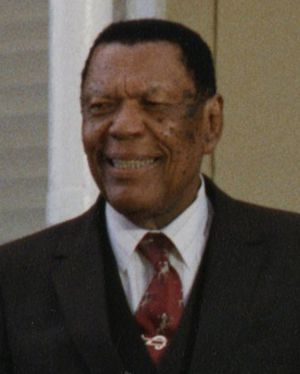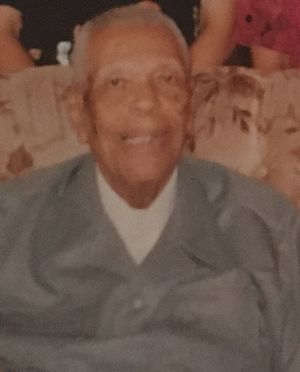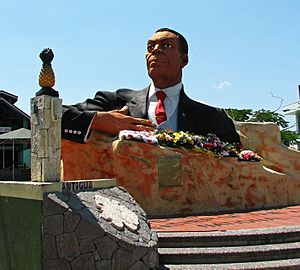Vere Bird facts for kids
Quick facts for kids
Sir Vere Cornwall Bird
KNH
|
|
|---|---|

Bird in 1986
|
|
| 1st Prime Minister of Antigua and Barbuda | |
| In office 1 November 1981 – 9 March 1994 |
|
| Monarch | Elizabeth II |
| Governor-General | Sir Wilfred Jacobs Sir James Carlisle |
| Preceded by | Himself (as Premier) |
| Succeeded by | Lester Bird |
| 1st Premier of Antigua | |
| In office 1 February 1976 – 1 November 1981 |
|
| Monarch | Elizabeth II |
| Governor | Sir Wilfred Jacobs |
| Preceded by | George Walter |
| Succeeded by | George Walter |
| In office 27 February 1967 – 14 February 1971 |
|
| Monarch | Elizabeth II |
| Governor | Sir Wilfred Jacobs |
| Preceded by | Himself (as Chief minister) |
| Succeeded by | George Walter |
| 1st Chief minister of Antigua | |
| In office 1 January 1960 – 27 February 1967 |
|
| Monarch | Elizabeth II |
| Governor | Ian Turbott Sir David Rose |
| Preceded by | Position established |
| Succeeded by | Himself (as Premier) |
| Personal details | |
| Born | 9 December 1910 St. John's, British Leeward Islands |
| Died | 28 June 1999 (aged 88) St. John's, Antigua and Barbuda |
| Political party | Labour |
Sir Vere Cornwall Bird, a National Hero of Antigua and Barbuda, was born on December 9, 1910. He passed away on June 28, 1999. He is famous for being the very first Prime Minister of Antigua and Barbuda.
Bird's son, Lester Bird, later followed in his footsteps and also became Prime Minister. In 1994, Sir Vere Cornwall Bird was officially named a "National Hero" for his important work.
Before his political career, he worked for the Salvation Army for two years. In 1943, he became the leader of the Antigua Trades and Labour Union. He first gained national attention when he was elected to the colonial government in 1945.
He then started the Antigua Labour Party. He served as the first Chief Minister, then Premier, and finally the first Prime Minister of Antigua and Barbuda from 1981 to 1994. He stepped down due to health reasons. In 1985, Antigua's international airport was renamed V.C. Bird International Airport in his honor.
Contents
Early Life and Learning
Vere Bird grew up in a less wealthy part of St. John's, the capital city. Unlike many other important political leaders of his time, he did not have much formal schooling. He only attended primary school at St. John's Boys School, which is now called T.N. Kirnon Primary School.
His Journey in Politics
Starting His Political Path
Bird spent two years working with the Salvation Army. However, he decided to leave to fight for the rights of local Black Antiguans and Barbudans. He saw how landowners were treating them unfairly.
In 1939, the Antigua Trades and Labour Union (ATLU) was created. Bird quickly became an important member. By 1943, he was the union's president. He led efforts to get better working conditions and higher pay for workers from the powerful sugar plantation owners.
The union first entered politics in 1946. Bird won a seat in the legislature and joined the Executive Council.
Leading Antigua and Barbuda
In 1951, a big change happened: all adults could vote, no matter how much property they owned. This is called universal adult suffrage. The ATLU, running as the Antigua Labour Party, won every seat in the legislature. They kept winning all seats until 1967. This showed that Antigua had a multi-party system, but one party was clearly chosen by the voters.
In 1956, a new system was introduced where ministers were in charge of different areas. The Governor gave Bird the role of overseeing trade and production. In 1960, he was named Chief Minister.
In 1967, Antigua became the first island in the Eastern Caribbean to get "associated statehood" from Britain. This meant Antigua could govern itself internally, but Britain was still in charge of foreign policy and defense.
Bird, who was very active in his younger days, started to become more conservative. There were some social problems and a split in the ATLU in 1967. Riots happened in 1968. Because of these challenges, the ATLU lost some of its strong control over Antigua and Barbuda's politics.
A new union, the Antigua Workers Union, was formed from the split. Later, the Progressive Labour Movement (PLM) was also created. Bird decided to resign from one of his positions because he felt it was not right to hold both.
In 1968, the PLM won four seats in a special election. By 1971, Bird was out of power. He lost the government to the PLM and also lost the parliamentary seat he had held for 25 years. George Walter, a former colleague, became the island's new Premier.
Return to Power and Independence
Bird's time out of power lasted only five years. By 1976, he won the government back. He had campaigned against independence, saying Antigua was not ready yet. He won the election again in 1980. This time, independence was a main part of his campaign.
With his powerful family, he led Antigua and Barbuda until 1994. He then left politics, making way for his son, Lester, to become Prime Minister.
Here are some of the important positions Sir Vere Cornwall Bird held:
- Chief Minister of Antigua: January 1, 1960, to February 27, 1967
- Premier of Antigua: February 27, 1967, to February 14, 1971
- Premier of Antigua: February 1, 1976, to November 1, 1981
- Prime Minister of Antigua and Barbuda: November 1, 1981, to March 9, 1994
His Impact and Legacy
Some people in Antigua had concerns about how the Labour Party was run. They felt it was like a "family business" with the Bird family always in charge.
However, Bird's supporters say his actions were necessary. They believe he helped free the country from the control of colonial sugar planters and British rulers. The Antiguan writer Jamaica Kincaid wrote about the Bird government in her book A Small Place.
Bird was part of a special group of strong trade union leaders. These leaders fought for change during colonial times and helped Caribbean countries gain independence. This group included Alexander Bustamante of Jamaica and Grantley Adams of Barbados.
Bird was one of the first people to organize workers in Antigua and Barbuda in the 1930s and 1940s. He fought his biggest battles in the sugar industry. He helped workers get better wages and the right to have paid annual holidays.
Bird was a tall and impressive figure. He understood that workers' benefits would be limited as long as big landowners controlled the government. So, he encouraged leaders from his union, the Antigua Trades and Labour Union, to run for political office. He also pushed for changes so that people who didn't own property could also run for elections.
Bird won a seat in parliament in the late 1940s. His party then led the politics of Antigua and Barbuda for many years. He eventually guided the islands to become independent from Britain.
Bird left a lasting mark on the labor movement, education, and the movement to unite the Caribbean. One of his big dreams was a Caribbean that worked together politically and economically. He strongly supported the West Indies Federation. When that group broke apart in 1962, he worked hard to create a federation of eight smaller countries.
In 1965, Bird, along with Premiers Errol Barrow of Barbados and Forbes Burnham of Guyana, helped create the Caribbean Free Trade Association (CARIFTA). This association later led to the Caribbean Community and Common Market (Caricom). Caricom now includes 12 English-speaking Caribbean countries.
On November 1, 1981, he became the first Prime Minister of Antigua and Barbuda. In 1984, his party, the Antigua Labour Party (ALP), won every seat in the Antiguan Legislature. This was a rare victory in Caribbean politics.
Awards and Passing
In 1994, Sir Vere Cornwall Bird was given the highest honor by his home country, Antigua and Barbuda. He was made a Knight of the Order of the National Hero (KNH).
Death
Bird passed away in St. John's on June 28, 1999, at the age of 88.
See also
 In Spanish: Vere Cornwall Bird para niños
In Spanish: Vere Cornwall Bird para niños
- List of foreign ministers in 1991
 | Jessica Watkins |
 | Robert Henry Lawrence Jr. |
 | Mae Jemison |
 | Sian Proctor |
 | Guion Bluford |



